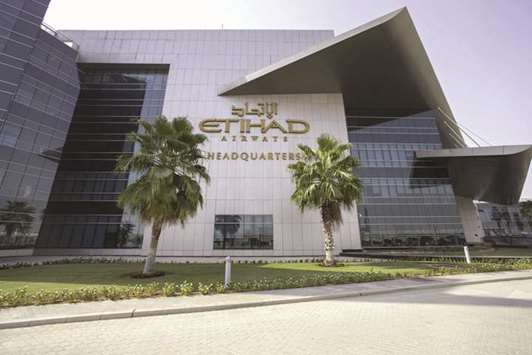A group of creditors to entities set up to finance affiliates of Etihad Airways said in a letter to the airline they were misled on its commitments to support part-owned carriers, two of which are now insolvent, a person familiar with the matter said.
The investors say they bought bonds issued by EA Partners between 2015 and 2016 after Etihad implied it would back the affiliates including struggling carriers Alitalia and Air Berlin, according to the person, who asked not to be identified because it’s private.
The group, represented by law firm Dechert, have sent a letter to Etihad asking to discuss the matter with its management and Abu Dhabi’s Department of Finance, the person said.
A spokesman at Etihad declined to comment on the letter. An external representative for Dechert also declined to comment.
Etihad set up two vehicles, EA Partners I and II, which sold $1.2bn of securities to raise funds for several airlines in which it owned stakes. Anoa Capital, a brokerage controlled by German businessman Lars Windhorst, helped arrange the deals.
The insolvency of Air Berlin and Alitalia, the two largest investments Etihad had made in Europe, forced EA Partners’ to auction claims linked to the airlines and ultimately failed to attract bids high enough to repay the notes at face value.
Emirates, the flagship airline based in neighbouring Dubai, is in talks for a potential acquisition of Etihad, people familiar with the matter said last month. Both airlines initially declined to comment, before later denying that any talks were underway.
Emirates chairman Sheikh Ahmed bin Saeed al-Maktoum and president Tim Clark have previously played down speculation that the carriers might combine, with Sheikh Ahmed saying in May that there have never been merger talks. Clark said in June that the question was one for shareholders, while adding that he saw nothing happening in the short-to-medium-term.
Etihad has been shrinking its operations following the failure of a so-called equity alliance strategy that saw it invest in a number of generally ailing foreign operators to help feed more traffic through Abu Dhabi. Air Berlin, collapsed last year while another, Italy’s Alitalia, filed for bankruptcy protection, causing the pact to largely unravel.
The Middle Eastern company also saw its own business come under pressure as a slide in the price of oil led to a drop in travel in crude-based economies. That contributed to a $1.52bn loss in 2017, taking the two-year deficit at the airline unit to almost $3.5bn. Fitch Ratings recently said it expected Etihad to continue losing money through 2022.

The headquarters of Etihad Airways Group in Abu Dhabi. Etihad has been shrinking its operations following the failure of a so-called equity alliance plan that saw it invest in a number of generally ailing foreign operators to help feed more traffic through Abu Dhabi.
